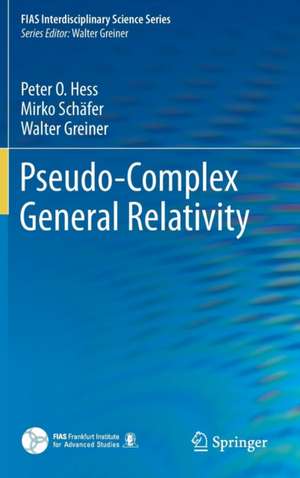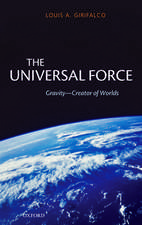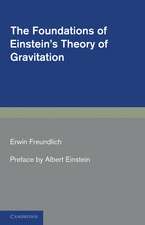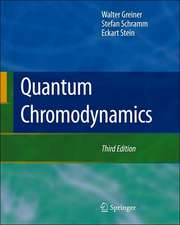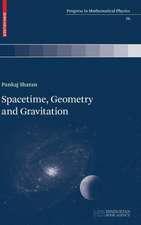Pseudo-Complex General Relativity: FIAS Interdisciplinary Science Series
Autor Peter O. Hess, Mirko Schäfer, Walter Greineren Limba Engleză Hardback – 6 noi 2015
| Toate formatele și edițiile | Preț | Express |
|---|---|---|
| Paperback (1) | 582.63 lei 6-8 săpt. | |
| Springer International Publishing – 23 aug 2016 | 582.63 lei 6-8 săpt. | |
| Hardback (1) | 588.83 lei 6-8 săpt. | |
| Springer International Publishing – 6 noi 2015 | 588.83 lei 6-8 săpt. |
Preț: 588.83 lei
Preț vechi: 692.74 lei
-15% Nou
Puncte Express: 883
Preț estimativ în valută:
112.67€ • 117.88$ • 93.60£
112.67€ • 117.88$ • 93.60£
Carte tipărită la comandă
Livrare economică 02-16 aprilie
Preluare comenzi: 021 569.72.76
Specificații
ISBN-13: 9783319250601
ISBN-10: 3319250604
Pagini: 276
Ilustrații: XV, 250 p. 33 illus., 11 illus. in color.
Dimensiuni: 155 x 235 x 19 mm
Greutate: 0.55 kg
Ediția:1st ed. 2016
Editura: Springer International Publishing
Colecția Springer
Seria FIAS Interdisciplinary Science Series
Locul publicării:Cham, Switzerland
ISBN-10: 3319250604
Pagini: 276
Ilustrații: XV, 250 p. 33 illus., 11 illus. in color.
Dimensiuni: 155 x 235 x 19 mm
Greutate: 0.55 kg
Ediția:1st ed. 2016
Editura: Springer International Publishing
Colecția Springer
Seria FIAS Interdisciplinary Science Series
Locul publicării:Cham, Switzerland
Public țintă
ResearchCuprins
Mathematics of pc-GR.- Pseudo-complex GR.- Pc-Schwarzschild, Kerr and Reissner-Nordström.- Pc-Robertson-Walker Metric.- Observational verifications of pc-GR.- Neutron Stars within pc-GR.- PC-differential geometry.
Notă biografică
Prof. Dr. Peter O. Hess, Mexico
Dr. Mirko Schäfer, Frankfurt, Germany
Prof. Dr. Dr. h. c. mult. Walter Greiner, Frankfurt, Germany
Dr. Mirko Schäfer, Frankfurt, Germany
Prof. Dr. Dr. h. c. mult. Walter Greiner, Frankfurt, Germany
Textul de pe ultima copertă
This volume presents an pseudo-complex extension of General Relativity which addresses these issues and presents proposals for experimental examinations in strong fields near a large mass. General Relativity is a beautiful and well tested theory of gravitation. Nevertheless, it implies conceptual problems like the creation of singularities (Black Holes) as a result of the collapse of large masses, or the appearance of event horizons which exclude parts of the space-time from the observation of external observers. The mathematical and geometrical foundations of this extension are displayed in detail, and applications including orbits and accretion disks around large central masses, neutron stars or cosmological models are introduced. Calculations both for classical and extended applications are often executed in the form of problems with extensive solutions, which makes this volume also a valuable resource for any student of General Relativity.
Caracteristici
Introduces general relativity with pseudo-complex coordinates Illustrates applications and new phenomena With problems and solutions
